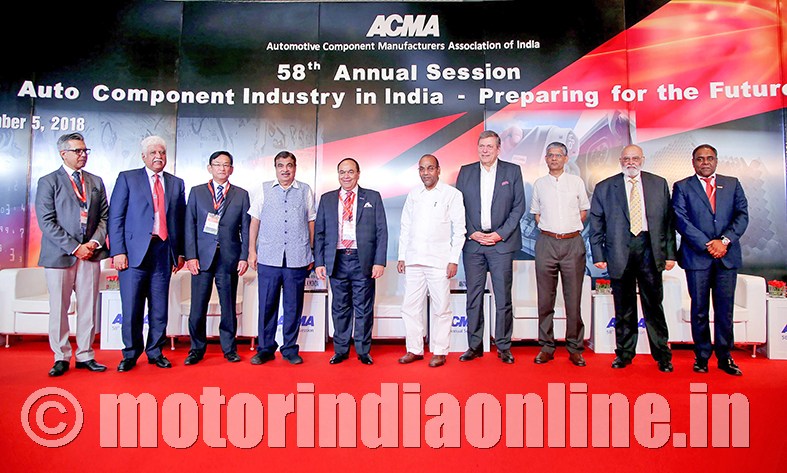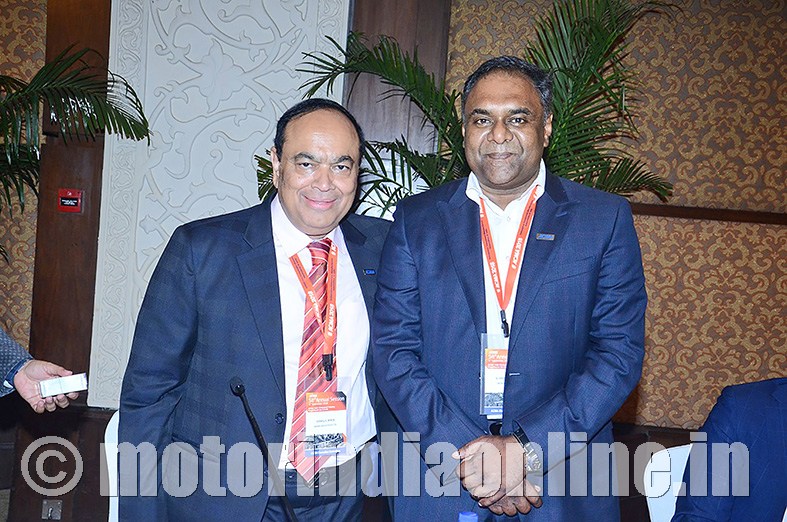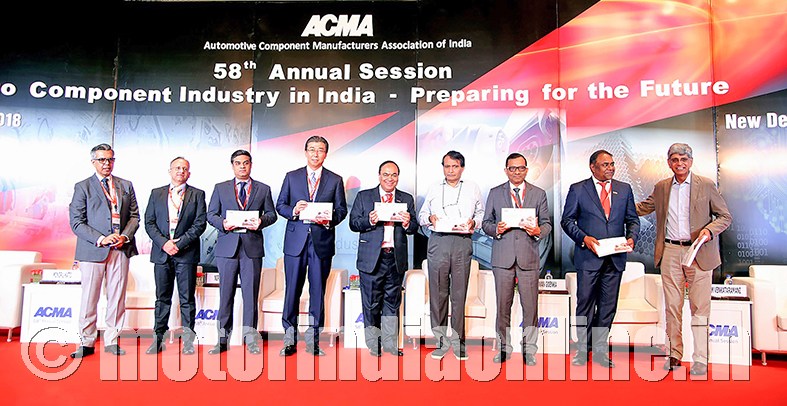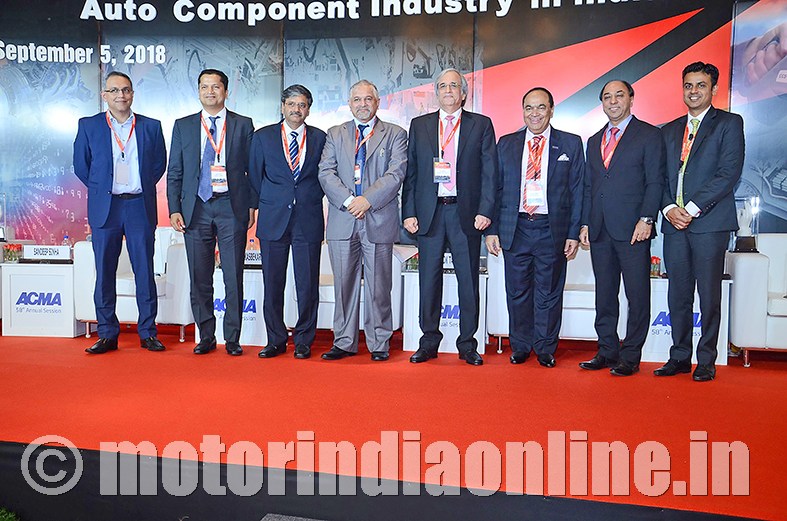The Automotive Component Manufacturers Association of India (ACMA) hosted its 58th Annual Session in New Delhi on September 5. It was addressed by Mr. Nitin Gadkari, Union Minister of Road Transport and Highways, Mr. Anant Geete, Minister for Heavy Industries and Public Sector Enterprises, Mr. Suresh Prabhu, Minister for Commerce & Industry and Civil Aviation, and Dr. Asha Ram Sihag, Secretary, Department of Heavy Industries, Ministry of Heavy Industry & Public Enterprises.

The event also witnessed keynote addresses by eminent leaders from the automotive industry including Mr. Kenichi Ayukawa, Managing Director, Maruti Suzuki India, Mr. Guenter Butschek, MD and CEO, Tata Motors, Mr. Minoru Kato, President and CEO, Honda Motorcycle and Scooter India, Mr. Rakesh Bharti Mittal, President, CII, and Executive Vice Chairman, Bharti Enterprises, Dr. Pawan Goenka, Managing Director, Mahindra & Mahindra, Dr. Abhay Firodia, President, SIAM, and Chairman, Force Motors, Mr. Nirmal Minda, President, ACMA, and CMD, Minda Industries, and Mr. Ram Venkataramani, Vice President, ACMA, and MD, IP Rings.
At the annual session, the ACMA study conducted by McKinsey & Co., themed “Auto component industry in India: Preparing for the future”, was released by the Chief Guest, Mr. Anant Geete. The study reveals that there are tremendous opportunities that await the auto component industry in India on the back of the growing vehicle consumption on the one hand and the introduction of next generation mobility on the other.
ACES – Autonomous, Connected, Electric and Shared mobility, as elsewhere in the world, will also impact the dynamics of the Indian automotive industry, and the opportunities in this space are contingent on the Indian auto component industry scaling up on the technology front.
Commenting on the future of the industry, Mr. Nirmal Minda observed: “The auto and auto component industry, globally and in India, is undergoing a transformation across its entire supply chain. Several factors such as new regulations on emission, safety & environment, fast-changing customer preferences and shifting economic dynamics and trade policies are reshaping our industry.
As is the case globally, e-mobility is fast catching the imagination of our policy makers. A definite policy delineating the road map for e-mobility in India is therefore the need of the hour. We are confident that as hybrid and electric technologies gain traction, vehicle manufacturers will support localisation of components.”
Mr. Nitin Gadkari said: “To strengthen the economy, our Government is actively pursuing the policy of substituting imports and boosting exports. I am pleased to see the auto component industry perform remarkable well in terms of both turnover and exports. I believe there are immense possibilities for this sector to grow further. Our Government is driving the agenda of promoting innovation, entrepreneurship, technology and research.”
Speaking further on excess dependence on fossil fuels, Mr. Gadkari added: “The Government is working towards a variety of alternative fuels as an effort to reduce carbon footprint by introducing first generation bio ethanol. The industry should come forward to develop the technologies to power the new generation engines.”
In his address, Mr. Anant Geete said: “The automotive industry is the top contributor to the Government of India’s ‘Make in India’ initiative and has accounted for maximum investments under the program. Going forward, we would be framing the auto policy in accordance with the current state of the automotive industry and demands of the future. I assure the Ministry of Heavy Industries will support the industry to resolve all issues and concerns.”
Speaking on the future, Mr. Suresh Prabhu remarked: “The Government has set a vision of realising a national GDP of $5 trillion in the next seven years with the manufacturing sector accounting for $1 trillion with the auto and auto component industry contributing significantly to it.”
A promising future
Growth indicators paint a picture of optimism for India. By 2023, India could be the world’s fifth largest economy, with a GDP of $4.7 tn. Anticipation of a growing consumer class, enhanced ease of doing business and expanding infrastructure could propel the country forward and, with it, India’s automobile industry. The Indian automotive OEM industry is already in a strong position. Globally India’s automotive industry is at the forefront of many segments, leading in two-wheelers, cars and tractors.
Trends shaping the automotive industry
As auto component manufacturers prepare for a future where they ramp up performance in India and globally, they need to account for numerous trends along four key dimensions that are shaping the industry:
- Constantly shifting market dynamics due to changing customer demands, manufacturing locales, operating models and priorities.
- The changing needs of OEMs who are likely to want different, more agile and rapid component inputs as demand, timelines and processes keep shifting.
- Technological improvements and discontinuities that are already starting to change revenue pools, trigger new competition and invite new forms of co-operation.
- An evolving regulatory and trade environment forming the backdrop for it all.
The opportunities ahead
The interplay of trends across these themes could fashion 10 exciting opportunities for auto component manufacturers:
- Pursue export opportunities aggressively.
- Enhance import substitution.
- Offer premium features at “Indian costs” more rapidly than before.
- Focus on component categories that could contribute more to vehicle costs in the future.
- Expand aftermarket offerings to capture value from enhancing the existing vehicle parc and aftermarket exports.
- Offer “rising star” components which could take off in the long run due to increase in electric vehicle (EV) sales.
- Offer new or modified features that will be in demand with an increase in shared mobility penetration.
- Develop data-enabled services and solutions.
- Form partnerships and ecosystems to create and capture value.
- Expand portfolio to serve adjacent industries.
Identifying which opportunities fit best, and working strategically to seize them, could create a successful future for auto component manufacturers.
The 58th Annual Session & National Conference concluded on a high note, with over 1,500 participants. Eminent speakers from the industry deliberated on the likely future of the auto and auto component industry. These included Mr. Ashok Taneja, MD & CEO, Shriram Pistons and Rings, Mr. Asutosh Padhi, Senior Partner, McKinsey & Company, Mr. CV Raman, Senior Executive Director, Maruti Suzuki India, Mr. Harish Lakshman, Vice Chairman, Rane Group, Mr. Hemant Sikka, President – CPO, Mahindra & Mahindra, Mr. Sandeep Sinha, Managing Director, Cummins India, Mr. Sanjay Labroo, Managing Director, Asahi India Glass, Mr. Shivanshu Gupta, Partner, McKinsey & Company, Ms. Shradha Suri Marwah, Managing Director, Subros, Mr. Soumitra Bhattacharya, Managing Director & President, Bosch India Group, and Mr. Vikram Kasbekar, Executive Director, Hero MotorCorp.
Ram Venkataramani is new ACMA President, Deepak Jain Vice President
ACMA has announced the appointment of Mr. Ram Venkataramani, Managing Director, India Piston Rings, as its President, and Mr. Deepak Jain, Managing Director, Lumax Industries Ltd., as Vice President for 2018-19.

Announcing the new leadership, Mr. Vinnie Mehta, ACMA Director General, said: “We are delighted to announce the appointment of Mr. Ram Venkataramani as ACMA President and that of Mr. Deepak Jain as Vice President. Mr. Venkataramani, an industry veteran, brings to the body over two decades of rich experience and a wealth of knowledge. Mr. Deepak Jain also brings in considerable proficiency and leadership that will help advance the ACMA agenda.”
Accepting the new responsibility, Mr. Ram Venkataramani, said: “It is a matter of privilege for me to be appointed as President of ACMA. Having deep roots in the auto component industry, I can well appreciate the challenges facing the industry today, especially in the light of several regulatory challenges as also enhanced customer expectations. It is an imperative for the component industry to invest in technology and focus on higher value addition to stay relevant and competitive.”
“In an industry where change is the only constant, I am confident that, with the support of the Government and all our stake-holders, we will not only overcome the challenges but also harness the newer opportunities that arise due to the technological transformations in the automotive industry.” he added.

